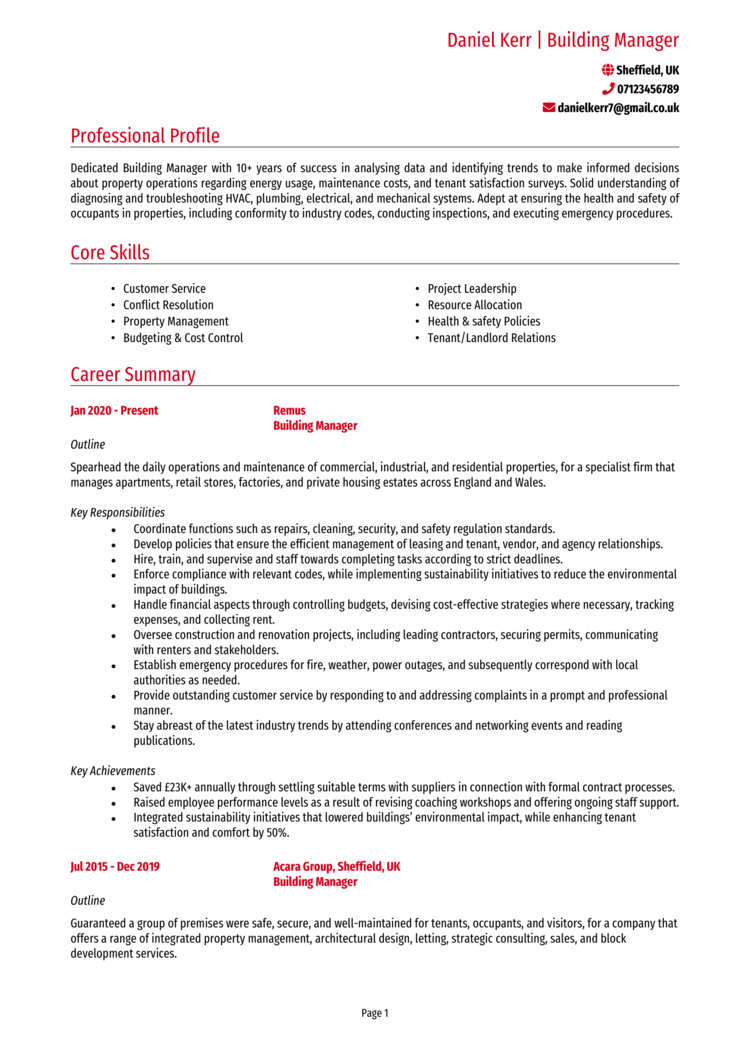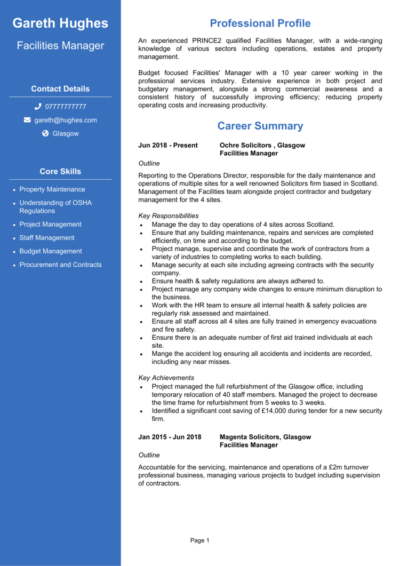From reactive maintenance and contractor wrangling to health and safety checks that never end – your work keeps spaces running like clockwork. But before you can take the reins at your next site, you’ll need a CV that reflects the same level of precision you bring to every shift.
This guide (with 3 CV examples) will show you how to present your wide-ranging experience in a clear, structured way – so hiring managers see a qualified multi-tasking problem-solver they can rely on.
Facilities Manager CV example

Building Manager CV example

Facilities Assistant CV example

How to write your Facilities Manager CV
Discover how to craft a winning Facilities Manager CV that lands interviews with this simple step-by-step guide.
Facilities management isn’t just about fixing what’s broken – it’s about keeping everything running before things go wrong. Your CV should reflect that mindset, showing employers that you can prevent chaos from taking hold.
This guide will help you write a CV that communicates the scale of your responsibilities and the value you’ve delivered across sites.
How to structure and format your Facilities Manager CV


In facilities management, order and clarity are essential – and your CV structure should follow the same principles. With so many responsibilities under your belt, it’s important to present your experience in a way that’s easy to digest. Keeping things ordered nicely will ensure recruiters don’t just move onto the next applicant.
Here’s the layout to follow:
- Name and contact details – Ensure your name and personal details are easily visible at the top. A photo is optional and depends on the role.
- Profile – Craft a short introduction that showcases your professional background and key accomplishments.
- Core skills – Give a bullet point list showing your key strengths and technical knowledge.
- Work experience – Outline your career progression in reverse order, emphasising your contributions and successes.
- Education & certifications – Include any qualifications like degrees and diplomas, and compliance training.
- Additional info – You can add hobbies or activities here that reflect your enthusiasm for the industry.
Keep your CV no longer than two pages in length. Use bullet points to make your experience easy to scan, divide sections clearly with headings, and choose a clean, legible font. Following these tips will ensure a formatted CV that shows you’re organised and detail-oriented: impressing recruiters before they even finish reading it.
How to write a Facilities Manager CV profile


This section offers a quick overview of your facilities management expertise. It should tell employers the value you’ve delivered across the different environments you’ve worked in, as well as the responsibilities you’ve managed. Overall, your CV profile needs to convince recruiters that hiring you would benefit them.
Facilities Manager CV profile examples
Profile 1
Experienced Facilities Manager with over seven years of experience overseeing building maintenance, contractor coordination, and compliance across commercial and office properties. Skilled in managing hard and soft FM services, ensuring health and safety standards, and optimising building operations. Proficient in CAFM systems and known for delivering efficient, cost-effective solutions while maintaining high service levels.
Profile 2
Organised and proactive Facilities Manager with six years of experience managing daily operations for corporate buildings and multi-site portfolios. Adept at contractor management, budgeting, and space planning. Strong background in workplace health and safety, risk assessments, and environmental compliance. Committed to creating safe, functional, and sustainable working environments.
Profile 3
Reliable Facilities Manager with eight years of experience across education, healthcare, and public sector sites. Experienced in overseeing reactive and planned maintenance, managing FM teams, and ensuring statutory compliance. Proficient in asset management and contract negotiation. Focused on service quality, operational resilience, and user satisfaction.
Details to put in your Facilities Manager CV profile
Here’s what to include:
- Where you’ve worked – Mention the types of sites you’ve managed (e.g. offices, healthcare, schools, manufacturing plants).
- Your top qualifications – Include health & safety training, IWFM qualifications, or building services certifications.
- Essential skills – Think team leadership, budget control, compliance management, or scheduling.
- Building systems knowledge – HVAC, security, plumbing, electrical systems, etc.
- Relevant metrics – Mention square footage managed, number of sites, or size of teams.
What to include in the core skills section of your CV


This section gives recruiters a quick, at-a-glance view of what you’re capable of. Use it to summarise your most relevant skills and strengths – particularly the ones that match the job you’re applying for.
Focus on practical knowledge, leadership capabilities, and operational understanding that show you can manage sites effectively and respond to changing demands. This is also a great section to tailor for each application, ensuring your experience aligns with the role’s priorities without overwhelming the reader with too much detail.
What are the most important skills for a Facilities Manager CV?
- Building Maintenance Oversight – Managing the upkeep of facilities, including HVAC, plumbing, electrical systems, and structural integrity.
- Health and Safety Compliance – Ensuring the facility meets legal safety standards through regular inspections, audits, and training.
- Vendor and Contractor Management – Coordinating with external service providers for cleaning, security, repairs, and specialised maintenance.
- Space Planning and Allocation – Optimising office layouts, workspaces, and communal areas to enhance functionality and efficiency.
- Budget Management – Creating and monitoring budgets for maintenance, equipment, and facilities-related expenses.
- Emergency Preparedness – Developing and implementing procedures for fire safety, evacuation, and disaster recovery.
- Sustainability and Energy Efficiency – Implementing green initiatives to reduce energy use, manage waste, and improve environmental performance.
- Asset Management – Tracking the condition and lifecycle of building assets and equipment for timely repairs or replacements.
- Facility Operations Coordination – Overseeing daily operations, including access control, reception, mail services, and security systems.
- Regulatory and Legal Compliance – Ensuring facilities meet local laws, codes, and regulations, including disability access and environmental standards.
How to write a strong work experience section for your CV


Employers want to see that you can handle the pressures of facilities management across a variety of tasks. Whether you’ve managed a single building or multiple sites, use your work experience section to demonstrate how you’ve kept spaces compliant and cost-effective.
List roles in reverse chronological order, including your job title, employer, and dates. For each, use bullet points to highlight your key duties and the improvements delivered. If possible, quantify your achievements with figures – such as budget savings and maintenance completion rates.
The best way to structure job entries on your CV

- Outline – Describe the company, type of facility, and your scope of responsibility.
- Responsibilities – Use action words like “led,” “oversaw,” “coordinated,” or “streamlined” to describe your duties.
- Achievements – Mention results like “reduced energy costs by 18%” or “achieved 100% compliance on annual audits.” You can also include safety records, downtime reductions, or staff development milestones.
Sample jobs for Facilities Managers
Facilities Manager | Halston Corporate Services
Outline
Oversaw daily facilities operations for a 10-storey commercial office building, ensuring efficient building performance and tenant satisfaction for a corporate service provider.
Responsibilities
- Managed hard and soft FM contracts, including cleaning, security, HVAC, and electrical maintenance.
- Coordinated planned preventative maintenance schedules and responded to reactive issues.
- Monitored contractor performance and ensured adherence to SLAs and H&S policies.
- Managed budgets, purchase orders, and cost-saving initiatives.
- Liaised with tenants and senior stakeholders to resolve issues and maintain service standards.
Achievements
- Reduced maintenance costs by 15% through renegotiated supplier contracts.
- Achieved full compliance on all statutory checks and audits for two consecutive years.
- Introduced a CAFM system that improved task tracking and contractor response times.
Facilities Manager | Westridge Education Group
Outline
Led facilities management for a portfolio of secondary schools, ensuring safe, compliant, and well-maintained learning environments across all sites.
Responsibilities
- Scheduled and monitored maintenance tasks, building inspections, and safety testing.
- Managed building projects including minor refurbishments and energy efficiency upgrades.
- Maintained building security, access control, and fire evacuation procedures.
- Liaised with school leaders, contractors, and local authorities on site matters.
- Implemented recycling programmes and sustainability initiatives across campuses.
Achievements
- Reduced energy costs by 22% through smart metering and HVAC system upgrades.
- Passed all fire and health & safety inspections with zero major actions required.
- Introduced a digital asset register that improved maintenance planning and budgeting.
Facilities Manager | Springford NHS Trust
Outline
Managed facilities and maintenance operations for a large healthcare site, supporting patient safety and building compliance across clinical and administrative areas.
Responsibilities
- Led a team of 12 FM staff, including maintenance operatives, porters, and cleaners.
- Ensured compliance with HTM and NHS safety regulations through regular inspections.
- Oversaw building systems including water hygiene, fire safety, and security.
- Worked closely with infection control teams to ensure hygiene and waste protocols were followed.
- Prepared monthly reports and contributed to estates planning and risk assessments.
Achievements
- Supported the successful delivery of a ward refurbishment project on time and under budget.
- Improved response time to urgent maintenance issues by 30% through revised rota scheduling.
- Commended by senior management for consistently high audit scores and team leadership.
How to list your educational history


While hands-on experience is key in this field, formal training and education still plays an important role. Start with your most recent or highest-level qualifications and work backward.
Include diplomas in building services, engineering, or management. Certifications like IWFM (Institute of Workplace and Facilities Management), IOSH, NEBOSH, or training in systems like CAFM or BMS should be included too. These all add weight to your CV and show a commitment to staying current and compliant.
What are the best qualifications for a Facilities Manager CV?
- IWFM Level 4 or 5 Diploma in Facilities Management – Recognised qualification for FM professionals.
- NEBOSH General Certificate in Occupational Health and Safety – Key for risk management and compliance.
- IOSH Managing Safely Certificate – Essential for team and site safety management.
- BIFM or ILM Management Training – Demonstrates leadership capability.
- CAFM or BMS System Training – Shows technical knowledge of facility management software tools.





